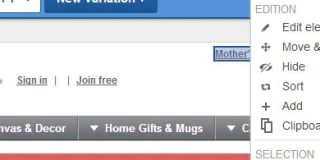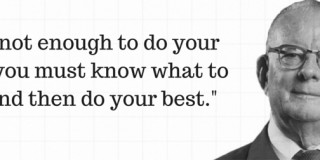Do you need to be a big company and need large volumes of traffic to be data driven?
No.
Even a single visitor is a piece of data that you can act on. A single survey response is better than nothing.
Sure, if you have less than 100 visitors / month to your site or just 10 survey responses, it can be difficult to separate outliers from the trend. But it’s still way better than no data.
Somebody commented in our Facebook group that “No data (ie traffic), no party.” That you can’t be data-informed without having a high volume site. That’s such bullshit.
You can do unlimited qualitative research – interviews, surveys, polls, user testing. If you only have 10 customers, you can meet up with each one of them one by one (even if over Skype or similar). If you have zero customers (no business yet), you can do customer development and interview tens or hundreds of people from the desired target audience.
With digital analytics you can still measure every action the few visitors are taking on the site. Measure macro goals (conversions) and micro goals (clicks, scrolls, interactions with widgets, etc).
All that data can help you shape your strategy, pick the right tactics and change course as needed.
You can always be data-informed and data-driven.
![How Much Data Do You Need to Be Data-Driven? [Rant]](https://cxl.com/wp-content/uploads/2017/03/low.jpg)




100% agree with Peep on this.
I recently brought on a new client who sells maternity/nursing wear. The clothes are of very high quality and the site oozes quality. Traffic is pretty low (around 1500 sessions per week), so they came to me for traffic acquisition. But I suggested they also had very low conversion rates (less than 0.3%) and convinced them to run a poll using Hotjar.
We ran with a very open ended question: ‘what are your first impressions?’ Within a day or two we had about 40 responses, split exactly 50/50. Half simply said ‘beautiful’ the other half said ‘expensive’. Literally. They all used the same word.
The site owner initially dismissed this with ‘oh, we always get that’!
The poll continued and the trend swung more in the direction of ‘expensive’. Over the course of a week or two, the comments came in and I tried to impress upon the owner that this was a real thing, but reassure her that at this stage it is simply a perception (a ‘first impression’).
Finally, last night (which is why this has struck a chord), I got an email from the owner: “Ok. So, we are perceived too expensive.”
We’ve only has 90 responses, but:
29% only commented on how beautiful the clothes are
19% said beautiful but too expensive
43% just outright said too expensive
9% said a variety of other random comments
So, even when we include those who love the clothes, 62% are saying (literally) ‘too expensive’.
We now have to determine if this is just perception, or if they site is way off the mark with pricing. But I believe this proves that even with a small amount of (qualitative) data you can learn SO much.
I have a hunch (not sure it qualifies as a hypothesis yet), that it’s largely because the site LOOKS expensive. I’ve seen other sites selling maternity clothing, similarly priced, but they LOOK cheaper and less exclusive. I think there may be some weird buy psychology going on here!
Question Peep: Have you seen this before, where something is perceived expensive because it has been designed to look too ‘upmarket’ and exclusive?
Listen to Peep people. Be data-driven. No excuses!
Murray, I’d love to know what Peep has to say about your situation, but based on my experience, I’ve noticed visitors often say it’s “too expensive” as a default excuse for not buying. It’s the “surface” excuse.
Although I’ve never personally noticed/tested a correlation between people saying it’s too expensive vs design, they often say it’s too expensive because they’re simply not convinced it’s worth it.
So – Why should they pay the premium? What’s unique about this product? What more would someone need to know in order to be convinced to buy?
I’d suggest changing your poll to something like “Is there anything holding you back from buying?”, and if they say yes, ask “What’s holding you back from buying?”.
This should give you more complete and actionable insights about why people aren’t buying.
In most cases, after running this question we’ve been able to pin-point the biggest objections people had, changed the product’s/landing page copy, and people stopped saying it was too expensive while sales increased.
Hope this helps.